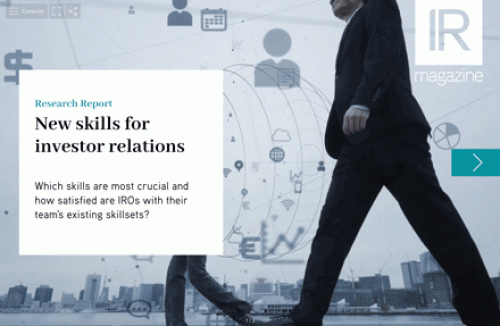Barbara Gasper, head of investor relations at MasterCard, speaks about her 40-year career
Barbara Gasper, head of IR for MasterCard, has announced that she will retire at the end of this year after a 40-year career. Gasper, who won IR Magazine’s lifetime achievement award in the US in 2014, started her career in IR in 1991 at steel company Lukens following a 20-year financial role with the company. Her journey to the IR role was, however, accidental, she says.
‘I was in the treasury department when the team made an acquisition that doubled the size of the company,’ she explains. ‘Because we doubled the size of the company, it started popping up more on investors’ screens. At the time it was the responsibility of the corporate communications executive, but she was getting financial questions that she couldn’t answer, so it was added to my responsibility.’
From her first role Gasper says the most important thing she learned was the importance of learning about the company so she could speak from a position of knowledge. ‘I like to find one person in each company [I’ve worked for] who I can to talk to, and who I can ask things like, What does the lingo mean?,’ she says. The importance of knowledge of the company is often underestimated, she adds: ‘You don’t want to sound like a talking head or someone just reading from a script. You want to be speaking from a position of knowledge.’
After her stint at Lukens she fell in love with investor relations and enjoyed IR roles at Raytheon, Lucent Technologies, PwC and Ford, where she was the first female investor relations officer. She has also served on NIRI’s national board and is a member of NIRI’s senior roundtable.
Gasper says the biggest challenge of her career came when her professional credibility was in jeopardy: she was at a point when she and a senior executive had a difference of opinion on how they wanted to deal with the Street. And to maintain her credibility, she decided to move to a new opportunity.
‘I ended up leaving that role and going elsewhere,’ she says. ‘In IR your professional credibility is all there is. You lose that with the Street and you might as well quit.’
Gasper was questioned by the government for breaching regulations and she saw ‘what happens when a company crosses Regulation FD and when I came away I realized I never wanted a management team on my watch to go through that.’
She joined MasterCard in 2006 to create the company’s investor relations department ahead of its IPO. She says her work at MasterCard is her biggest triumph, having helped the company with its evolving investor-related needs as it grew from a market cap of $4 bn to more than $100 bn.
Over the past 40 years Gasper says the IR role has evolved and become more valued. ‘Years ago you had to fight for a seat at the table,’ she says. ‘Now you still have to prove yourself worthy of that seat, but it’s a more valued role.’
She adds that the Wall Street community has also become more complicated. ‘[In the past], you didn’t have hedge funds and dark pools, you didn’t have day traders,’ she explains. ‘There were many more traditional investors, mostly long-only institutional investors and retail investors.’
From November 1 she will hand over the reins to Warren Kneeshaw, who comes from Qualcomm, where he has been a member of the team for the past 13 years. Kneeshaw is a ‘seasoned IRO,’ Gasper says. Once he gets up to speed with the payment industry she expects he will make ‘some changes’ as he casts a fresh set of eyes over operations.
For present and future IROs, Gasper’s biggest piece of advice is: don’t overperfume the pig. ‘If it’s a pig, it’s a pig,’ she continues. ‘Don’t hide from the challenges. Talk about what you are going to do to make things better. Acknowledging challenges is how [IROs] maintain credibility.’
Gasper says she hasn’t decided what’s next, but she is ‘certainly not ready for the rocking chair.’ She wants to stay involved in the IR community and has just begun searching for other opportunities.










